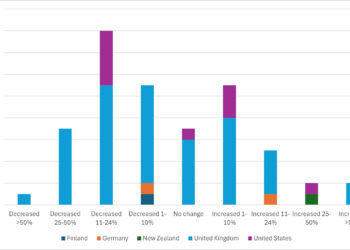 2015 has already started with a bang and we think there’s more to come, as you’ll see from the Chef’s responses to the question: What do you think will have the biggest impact on scholarly publishing in 2015?
2015 has already started with a bang and we think there’s more to come, as you’ll see from the Chef’s responses to the question: What do you think will have the biggest impact on scholarly publishing in 2015?
According to the Chefs, we’re looking at a year of mergers and acquisitions, the continuing growth of open access both in number of opportunities and in scale, the publication of data and objects (like multimedia, application code, etc.), and more start-ups.
What do YOU think will shape scholarly publishing in 2015?
Joe Esposito: The biggest topic for scholarly communications will be the mainstreaming of Gold OA, as evidenced by Elsevier’s recent announcement of an OA megajournal and kindred announcements from IEEE, John Wiley, and others. These new services are surely intended in part to take PLOS down a peg, but even as they do that (assuming PLOS doesn’t have something up its sleeve), they are making the case for OA, and that has broader implications in terms of acceptance by researchers and conservative administrators. The competition in this area will bring about a great deal of invention, as competition always does. There is at this time no way to pick the winners from the losers.
But is PLOS a sitting duck? PLOS and PLOS alone has several years of history of running a megajournal. What has the management there been thinking? How have they assessed their own strengths and weaknesses? So another way to think about 2015 is that it will be a parable of the PLOS management. Will they withstand the onslaught? Will they take their species of publishing to a new level, as the iPod took a quantum leap to the iPhone?
Kent Anderson: I think the Matthew Effect will have the biggest impact on scholarly publishing in 2015 – that is, the big will continue to get bigger, the rich will continue to get richer. We are in a market in which efficiency is at a premium, and that means scale. Production systems, marketing capabilities, platform elements, and business functions all work better at scale, and very few products are able to generate enough of a price premium to remain singletons. Therefore, the general trend is toward consolidation and scale in the market. Buyers want more efficient buying – more bang for the buck, fewer transactions, and so forth. Sellers can sell more effectively if they have more to sell. This is not a new trend by any means, but it seems to be accelerating, we are baking the fundamentals into the market everywhere, and I think everything else pales by comparison. It affects OA and subscription journals, especially as price competition around APCs is now as hot as negotiations in the library market.
Rick Anderson: I suspect that two important things will happen this year, both of which will have a significant impact on scholarly publishing. First, in the US: as of March 24, 2014, all agencies affected by the provisions of the White House OSTP memo on public access to data and publications resulting from publicly-funded research had reportedly submitted their draft policies for review, those policies had been returned to them with comments, and the agencies were revising them. I expect that we’ll see the final versions of those plans sometime this year. Second, in the UK: discontent (from all points on the advocacy spectrum) over the RCUK’s OA policy seems to be growing. That’s just a subjective impression, but I wouldn’t be surprised if the discontent comes to a head in some way this year; if it does, that could have a pretty big impact on publishing as well.
Alice Meadows: This is an almost impossible question to answer – so much is changing so fast in our industry at present. The recently announced Macmillan/Springer merger will certainly have a major impact on scholarly publishing over the next few years though, given how long the mechanics of the merger are likely to take, I think the impact will be felt more in 2016 and beyond.
OA will inevitably continue to dominate much scholarly publishing debate in 2015. There must be a strong possibility of a new mandate or policy this year that could have a major impact on our business – perhaps from a major market such as Japan – though again, this would likely be felt more in years to come than now. Maybe this will be the year in which we start to see the long-anticipated impact of the overall downward trend in embargo periods (12 months for STM and SSH alike seems to be the new norm, and some funders – including the EC – are mandating 6/12 months). Or perhaps the tide will finally start to turn towards Gold OA as both the UK and, more recently, the Dutch governments hope. If so, however, the Dutch model may come at too high a price for some publishers – the right for all future articles whose corresponding author has a Dutch affiliation to be published on an open access basis for no extra charge. And what about the impact of the negotiations over this new model between Dutch universities and the major publishers – will it result in a new business model that satisfies all parties, or will it signal a breakdown between the two groups?
One thing is clear to me – whatever new challenges come our way during 2015, scholarly publishing will continue to survive and thrive through a combination of collaboration, cooperation, and flexibility.
Michael Clarke: Mergers and acquisitions will have a seismic impact in 2015. January is not even over yet and we have already seen a shifting of the industry’s tectonic plates, with Macmillan joining up with Springer. The force driving M&A is the end of site licensing as an engine of substantive growth. Library budgets are flat and there are fewer untapped markets to sell into. So where is the growth? There are only two options. The first is to get bigger to lock up a larger percentage of the library budget. That is the strategy behind the MacMillan-Springer merger. The second option is to develop new products that taps different revenue sources. This is why everyone and his brother, sister, and cousin is rushing to launch new author-pays OA journals. But OA funding has limits so the smart money will start to look beyond to other product categories (online learning products, decision support products, maintenance of certification, online reference, practice management, data services, information management, and so forth). There are a lot of start-ups in this space and I suspect we are going to see them start to get scooped up by established players looking for new growth areas. There will also be horse trading as publishers look at strengths and weaknesses in their portfolios and acquire and divest accordingly.
David Crotty: I think two of the three big issues for 2015 have been covered recently in The Scholarly Kitchen: Consolidation and Compliance. We’ve been an industry going through a period of consolidation for a while now, but it seems like the pace is accelerating. At the same time, we’re just at the wavefront of funder, government and institutional mandates for access to the research literature, so things are quickly going to get a lot more complicated.
The other big issue is data. Access to papers is straightforward, and chump change when compared to the potential value offered by access to actual research data. When we talk about “research results”, we must remember that the paper and its copyright only cover the words written about the discovery and the pictures used to describe it. The actual discovery is what matters, but requiring access brings in all sorts of complications, from intellectual property to patient confidentiality. I don’t expect to see a lot of movement on the data front in 2015, but I do expect to see a lot of time spent talking about it, planning policies and working through the intricacies that need to be understood before any sort of policy can hope to be successfully implemented.
David Smith: “Events my dear boy, events” as Harold Macmillan never said. Over here we are in the 4 month run up to the next general election. The results of that could, long term, impact on Scholarly Publishing especially if it does trigger a referendum on the UKs continued membership of the EU. The European Commission looks to be raiding the Horizon 2020 budget to supply yet another stimulus package to the European economy. The Venture Capital folk are sniffing around our world with ever increasing interest it seems, and so one should assume that given the meager offerings our world can deliver vs the stratospheric growth available elsewhere, their interests lie in exploiting scholarly data in other ways. All of which is my way of saying “I’ve no idea!”
Phill Jones: I was lucky enough to be able to attend the STM tech trends brain storm last month in London, which was in the same week as the excellent STM Innovations Seminar. One of the things that was mentioned frequently that week was the idea that objects other than traditional articles are going to become increasingly important as research outputs. First and foremost with data, the trend is beginning to expand into other areas, such as multimedia documentation of methods and medical procedures, and computer code.
While the trend towards data sharing is pretty clear at this point, I think that in order to be proactive, we must look at what’s driving the trend. From the early days of the current open access movement, funders have been increasingly using their economic power to affect change in scholarly communication. Recently, I’ve heard of some funders who are looking to discourage the hybrid business model. There is even talk about asking researchers to declare their experiments in advance and make all results available. I don’t think that last one is likely to happen, but I’ll be keeping an eye on what funders say and do this year.
Robert Harington: My first response to this question was to consider the impact of large scale economic forces globally. Fear of what such forces may do is clearly driving further consolidation of the larger publishers. Where there is slow growth, efficiencies must be found, and costs and people cut to maintain shareholder value. My second response to this question was to think about the short term. While on the one hand, macro-economic forces will certainly affect scholarly publishing. On the other hand, it may be that amidst all the consolidation, we will see an emergence of the upstarts – the small, start-ups that find a way to challenge the status quo. Provided these new companies do not just become absorbed back into the corporate fold, we may look back on 2015 as the year of the entrepreneur.
Todd Carpenter: The biggest impact on scholarly publishing will be the increasing availability and growing culture among scientists of sharing scientific data. This trend has been growing for the past several years, but is starting to hit a tipping point. While the initial focus on the OSTP memo from 2013 was on the OA article mandate, the associated mandate about data sharing is probably more impactful on the nascent data exchange culture and will cause a greater shift in how science and scholarly communications takes place. It will take years to work through all the challenges and nuances associated with data sharing: Where should it go? How long should we keep it? How do we describe it for future discovery? What tools are available to interlink it and make it interoperable? All of these things will need to be addressed, and in 2015 we will just begin to scratch the surface. The implications of these activities are likely to be profound and broad reaching if agencies fully embrace and demand compliance with the mandate.
Judy Luther: My vote goes to industry consolidation. The pending merger of Macmillan Science and Education and Springer Science and Business Media follows the demise of Swets less than six months ago. Although these occurred for very different reasons, both reflect the pressures that are on traditional publishing – whether a primary publisher or an intermediary. Over the last 18 months Tim Collins rose to the helm as CEO of EBSCO Industries which resulted in the subscription services being positioned as Journal and e-Package Services as part of EBSCO Information Services which now includes all services previously offered by EBSCO Publishing. We’re in a period where big organizations will get bigger at the same time that new initiatives, such as those included in Digital Science, draw attention to innovative approaches to transforming digital publishing.
Discussion
8 Thoughts on "Ask The Chefs: What Do You Think Will Have The Biggest Impact On Scholarly Publishing In 2015?"
Fantastic post! Thanks for sharing your insights!
A lot of people have mentioned consolidation, but is this going to happen to society publishers and university presses in any way other than their journals being absorbed or taken over by the largest publishers? Does anybody think any university presses or societies will themselves merge? In the CIC in the late 1990s the provosts were proposing a merger of all the Big Ten presses into the University of Chicago Press, with only separate editorial offices remaining on each campus. No one has suggested this anytime since, to my knowledge. Have their been any mergers of scholarly societies–ever? Given the fragmentation of knowledge, the trend always seems to be for more, and more specialized, societies, not fewer or bigger ones.
As for OA initiatives, don’t forget the new Open library of Humanities mega-journal and another one coming from the University of California Press. The PLOS model is finally making its way into the humanities.
There are ways in which university presses are consolidating, though they’re somewhat less visible. For example, OUP does warehousing and fulfillment for a group of smaller university presses, putting all under one roof in this aspect, and gaining economies of scale. Similarly, efforts like University Press Scholarship Online (UPSO http://www.universitypressscholarship.com/) brings together some 18 university presses onto a common platform.
The PLOS model is finally making its way into the humanities.
Didn’t SAGE Open do this back in 2011?
Yes, that kind of cooperation has long existed. Just think of what Johns Hopkins did for university press journal publishers with Project Muse. But if you are talking about true mergers, that almost never happens with university presses. The only two exceptions I can recall are Ohio University Press buying Swallon Press and Iowa State University Press being sold to a commercial publisher (Elsevier?).
Sage publishes in the social sciences, not in the humanities, to my knowledge.
I expect to see this sort of cooperation increasing as it becomes more and more difficult to compete against larger and larger commercial publishers.
Sage publishes in the social sciences, not in the humanities, to my knowledge.
SAGE Open is described as follows:
http://sgo.sagepub.com/
SAGE Open is a peer-reviewed, “Gold” open access journal from SAGE that publishes original research and review articles in an interactive, open access format. Articles may span the full spectrum of the social and behavioral sciences and the humanities.
Several people have mentioned the US Public Access program finally emerging and that will certainly generate a lot of thought, especially if it comes in the form of dozens of regulatory proposals for public comment. Regarding data, there is indeed a lot of issue analysis to be done. Two of the biggest issues, namely burden and money, seem to get relatively little attention. Maybe that will change.



